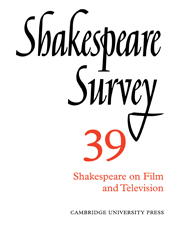Book contents
- Frontmatter
- Shakespeare and the Media of Film, Radio and Television: A Retrospect
- Shakespeare on the Screen: A Selective Filmography
- Chimes at Midnight from Stage to Screen: The Art of Adaptation
- Orson Welles’s Othello: A Study of Time in Shakespeare’s Tragedy
- Macbeth on Film: Politics
- Representing King Lear on Screen: From Metatheatre to ‘Meta-cinema’
- Verbal-Visual, Verbal-Pictorial or Textual-Televisual? Reflections on the BBC Shakespeare Series
- Two Types of Television Shakespeare
- Shakespeare on Radio
- The Dismemberment of Orpheus: Mythic Elements in Shakespeare’s Romances
- Remembering Hamlet: or, How it Feels to Go Like a Crab Backwards
- ‘Then murder’s out of tune’: The Music and Structure of Othello
- The 'Aeneid' in 'The Tempest'
- The Living Dramatist and Shakespeare: A Study of Shakespeare’s Influence on Wole Soyinka
- Shakespeare at Stratford, Ontario: The John Hirsch years
- Shakespeare Performances in London and Stratford-upon-Avon 1984–5
- The Year's Contributions to Shakespearian Study 1 Critical Studies
- 2 Shakespeare’s Life, Times, and Stage
- 3 Editions and Textual Studies
- Index
Macbeth on Film: Politics
Published online by Cambridge University Press: 28 March 2007
- Frontmatter
- Shakespeare and the Media of Film, Radio and Television: A Retrospect
- Shakespeare on the Screen: A Selective Filmography
- Chimes at Midnight from Stage to Screen: The Art of Adaptation
- Orson Welles’s Othello: A Study of Time in Shakespeare’s Tragedy
- Macbeth on Film: Politics
- Representing King Lear on Screen: From Metatheatre to ‘Meta-cinema’
- Verbal-Visual, Verbal-Pictorial or Textual-Televisual? Reflections on the BBC Shakespeare Series
- Two Types of Television Shakespeare
- Shakespeare on Radio
- The Dismemberment of Orpheus: Mythic Elements in Shakespeare’s Romances
- Remembering Hamlet: or, How it Feels to Go Like a Crab Backwards
- ‘Then murder’s out of tune’: The Music and Structure of Othello
- The 'Aeneid' in 'The Tempest'
- The Living Dramatist and Shakespeare: A Study of Shakespeare’s Influence on Wole Soyinka
- Shakespeare at Stratford, Ontario: The John Hirsch years
- Shakespeare Performances in London and Stratford-upon-Avon 1984–5
- The Year's Contributions to Shakespearian Study 1 Critical Studies
- 2 Shakespeare’s Life, Times, and Stage
- 3 Editions and Textual Studies
- Index
Summary
Each of the three important directors – Welles, Polanski, and Kurosawa – who attempted to recreate Macbeth on the screen has had to come to terms with the play’s reverence for monarchy. Despite idolatrous claims that Shakespeare was not of an age but for all time, the royal play of Macbeth unabashedly celebrates a semi-divine monarch in terms specific to the first years of Stuart absolutism. King Duncan is thoroughly paternal, compassionate, and regal. Of him even devilish Macbeth testifies that he ‘hath borne his faculties so meek, hath been / So clear in his great office, that his virtues / Will plead like angels, trumpettongu’d, against / The deep damnation of his taking-off’ (7.17–20). Macbeth’s politics are cyclical, and the play cannot conclude until the pure and untainted Malcolm, Duncan’s son and the usurper’s successor, invites home ‘our exil’d friends abroad / That fled the snares of watchful tyranny’ (5.9.32–3), and, invoking the ‘grace of Grace’, sets out to be invested at Scone. The play’s satisfaction with the traditional order, though severely tested by the reign of the tyrant, is confirmed when a second exemplary monarch succeeds his father.
- Type
- Chapter
- Information
- Shakespeare Survey , pp. 67 - 74Publisher: Cambridge University PressPrint publication year: 1987



